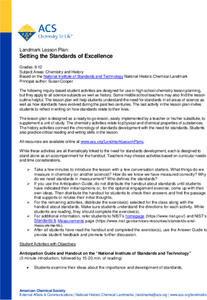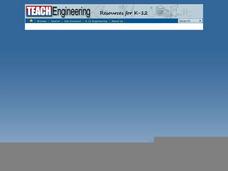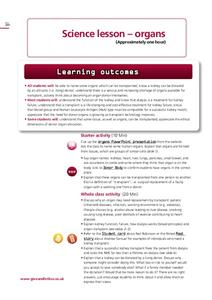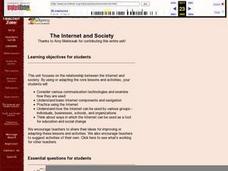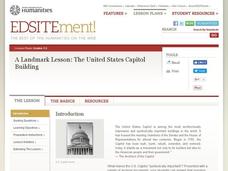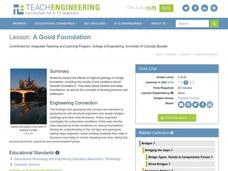American Chemical Society
Setting the Standards of Excellence
A number doesn't have much meaning without a standard of reference. Learners read about the history of developing standards to measure chemical and physical properties and complete reading guides to process the information. They focus on...
American Chemical Society
Dissolving is a Property
Believe it or not, it is possible for liquids and solids to get along! A hands-on lesson has individuals explore dissolving properties of candies in water. They complete an activity guide to record observations about different candies...
Curated OER
D Block Elements: Complex Ions and Oxidation States
Students investigate transition metals and their oxidation states. In this complex ion and oxidation states lesson plan, students use 6 transition metals and mix them with ligand solutions and oxidizing agents separately. They test their...
Massachusetts Institute of Technology
List of Chemicals in Space
What is space made of? It turns out that there are many compounds found in space! The 10th lesson of a science series provides a list of the compounds found in space and asks young scholars to research the characteristics of these...
Nature Works Everywhere
Fishing for a Future
Teaching a man to fish has an environmental impact. Through a series of four lessons, learners study the science of fishery management. Their study involves analyzing data to develop a management strategy for specific fish and common...
Howard Hughes Medical Institute
Using the Scientific Process to Study Human Evolution
Did humans and dinosaurs coexist? How do we know? Scholars dig in to the tools and methods researchers used to study the process of human evolution by watching a slideshow with embedded video clips. Pupils learn the importance of asking...
American Press Institute
In the Newsroom: The Fairness Formula
Reporting the news is easy, right? Think again! Show young scholars the difficult choices journalists make every day through a lesson that includes reading, writing, and discussion elements. Individuals compare the language and sources...
WE Charity
High School–Module 2: Circular Economy and Nature
Everyone's heard the popular slogan reduce, reuse, recycle, but there may be a better way to talk about sustainability. Using the second lesson from the five-part WE Are Innovators—High School Modules series, learners explore issues...
Teach Engineering
Both Fields at Once?
An MRI uses both a magnetic and electricity, so how do the two interact with each other? Class members observe the effects on a charged particle when it is subject to both an electrical and magnetic field. The teacher background...
Benjamin Franklin Tercentenary
Benjamin Franklin, Elder Statesman
Ben Franklin was the only American to sign The Declaration of Independence, the Treaty of Alliance with France, the Treaty of Paris, and the US Constitution. An interesting resource explores his role in the latter by comparing the US...
Howard Hughes Medical Institute
The Day the Mesozoic Died
While this is not the traditional, step-by-step lesson plan, it is chock-full of material that you can easily incorporate into your earth history unit. Its main purpose is to serve as a guide to using a three-part film, The Day the...
Teach Engineering
Electricity and Magnetic Fields
Introduce your class to the idea of magnetic fields around electrical wires with an activity that provides the information about the direction of a magnetic field around a wire carrying an electric current.
Give and Let Live
Blood and Transplant: Organs
Who donates organs, and how do organ donations work? The third lesson in a four-part series discusses the tremendous need for donor organs of all ages and backgrounds. A variety of materials, included with the teacher's guide, walk...
Judicial Learning Center
Separation of Powers/Qualifications of Office
Time to work together in class to understand the separation of powers as well as the qualifications for office! The resource includes terms to review for pre-knowledge before beginning instruction. Following the review, pupils work on a...
Curated OER
The Internet and Society
Learners consider the impact of the Internet on society, information, and communication. They practice using the Internet through a variety of web searches, information gathering activities, and Internet communication. A class discussion...
Curated OER
A Landmark Lesson: The United States Capitol Building
Students study the events in American history that affected the US Capitol Building. They name activities that happen in and around the Capitol by looking at primary source documents that are available online.
National Endowment for the Humanities
Revolution '67, Lesson 1: Protest: Why and How
To some people, protesting is as American as apple pie, but the factors that lead to protests can be as confusing to veteran activists as to today's youth. Revolution '67 explores the riots in Newark, New Jersey as a case study. Using...
Forest Foundation
Exploring Heat & Energy
How does fire keep itself going? Explore the ways that heat uses fuel and energy with a lesson about the fire triangle and combustion. Several activities demonstrate how heat moves from warmer objects to cooler objects, as well as the...
Indian Land Tenure Foundation
Elders' Stories
Very young learners study the ways that oral traditions play such a huge part in the culture of Native Americans. They see how Elders pass along stories to the younger generations. If possible, a tribal Elder comes into the class to...
Novelinks
The View From Saturday: Concept/Vocabulary Analysis
Design your unit on The View From Saturday by E.L. Konigsburg with a concept and vocabulary analysis resource. It outlines the plot, literary elements, vocabulary issues, and any possible considerations for planning a differentiated...
Curated OER
Unit 3: Scientific Writing
Write-on! Demonstrate a writing model and support learners as they write an informational essay on a water resource issue of your (or their) choosing. The lesson plan provides a well-scaffolded summative writing experience that wraps up...
Teach Engineering
A Good Foundation
It takes a strong foundation to build a house and a stronger one for a bridge. This resource presents the effects of geology and soil on bridge foundations. Working in groups, the class investigates the interaction of shallow and deep...
Teach Engineering
The Great Pacific Garbage Patch
The Great Pacific Garbage Patch is one of several garbage patches around the world where garbage accumulates naturally. As part of a GIS unit that combines oceanography, environmental science, and life science, class members investigate...
Teach Engineering
Skeletal System Overview
It is best to know all about the skeletons in the closet. The third segment in a five-part series focuses on bone structure, development and growth, and functions. Class members connect what they learn to their study of osteoporosis.
Other popular searches
- Guided Reading Lesson Plans
- Guided Discovery Lesson Plan
- Guided Drawing Lesson Plans
- Guided Writing Lesson Plans
- Guided Lesson Plan
- Guided Inquiry Lesson Plans
- Guide Reading Lesson Plan


